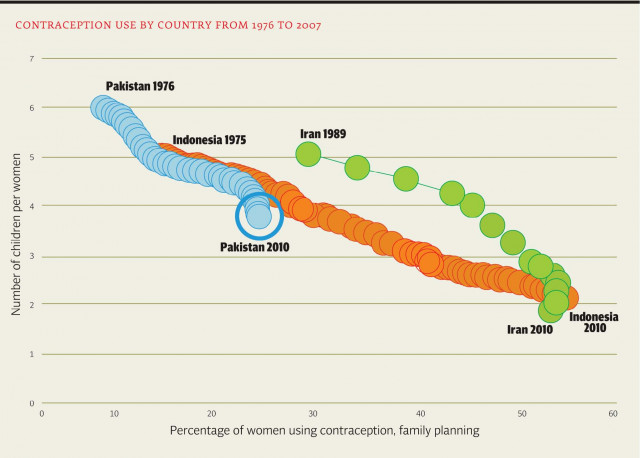Abortion is not a good method of ‘contraception’
Almost 200,000 women a year (one every three minutes) are treated in hospitals for abortion-related complications.

Abortion is not a good method of ‘contraception’
These days she spends most of her time preparing for her eldest daughter, 20-year-old Lalita’s upcoming wedding. The “shaadi ka jora” and accessories have to match and the snack menu may be limited, but right. Lalita’s mother wants to put on the best show she can for her child’s special day. But what Lalita and other young brides probably need most is someone who can guide them on family planning. For her part, Lakshmi says that she hasn’t talked to Lalita about contraception because they are “unsafe”. And what if her husband leaves her for another woman? Children are an act of God which should not be tampered with.
According to the Pakistan Demographic Health Survey, 70 per cent of the country does not use any means of family planning despite a population explosion. A lack of family planning also exposes mothers and their babies to health risks. Women not using contraception, and who alread have a host of children, thus turn to more dangerous methods of abortions late in their pregnancies, which keep coming. Statistics from the Incidence of Abortion in Pakistan, Studies in Family Planning, estimate 900,000 abortions a year, most of which are performed using unsafe methods, majorly because many women believe abortions are illegal. As a result, almost 200,000 women a year (one every three minutes) are being treated in hospitals for abortion-related complications.
Speaking at a seminar on the topic at the Jinnah Postgraduate Medical Centre (JPMC), president of the National Committee of Maternal and Neonatal Health, Dr Sadiqua N Jaffarey said that under Islamic law, a woman can abort within 120 days from conception. “Life is blown into the foetus after 120 days which is why abortion is permitted prior to this period,” she explained.
However, the need for drastic measures such as abortion arises only because contraceptives are not promoted aggressively, said Dr Mohsina Bilgrami, managing director, Marie Stopes Society, while speaking to The Express Tribune. “Anyone can give a woman a pill and tell her how to use it,” she said, adding “that first everyone needs to start using contraceptives and then worry about the side effects.”
On the other hand, Dr Imtiaz Kamal, president of the Midwifery Association of Pakistan, counters that fully educating women about the side-effects of their method of contraception is essential. Failure to do so leads to many myths and misconceptions which then deters their use.
Speaking about the ground realities, the chief executive officer of the Health and Nutrition Development Society (HANDS), Dr Tanveer Ahmed, focused on the crucial role played by Lady Health Workers (LHW) as well as other community health service providers. “They (LHW) have direct access to 54 per cent of the population and are the ones who can best promote contraception use, the necessity of family planning and the dangers of unsafe abortion,” he said. “Health workers definitely need to be more patient and understanding.”
On the accessibility and availability of contraceptives, even the most popular method of condoms, consultant obstetrician and gynaecologist at OMI, Dr Sadiah Ahsan Pal, said marketing was the biggest tool many have ignored so far. “People need to know where they can go buy contraceptives,” she said, adding that it was very important for women to feel comfortable when they go to buy them. “Money for contraceptives isn’t a problem for many,” Dr Bilgrami added. “But lack of awareness is. Also men who control the contraceptive use in the family need to be brought on board.”
The experts agreed that education on the various methods of contraception, their side effects and option of legal period of abortion need to be communicated to young couples, especially prior to marriage, when family planning can be structured best.
According to Iran’s model of family planning, couples get a medical check-up and blood tests prior to marriage, a system that has received wide acclaim. In fact, other Muslim countries such as Indonesia and Bangladesh also have aggressive family planning programmes in an attempt to control their robust populations. Over the years, their women have been moved on to contraception and have started having better planned families with just the right number of children.
Meanwhile, Lalita secretly fears her fate will be similar to her mother’s, saying she has no idea about family planning or what her future husband thinks about the issue. Still, she promises herself she will find out.
Published in The Express Tribune, October 21st, 2010.



















COMMENTS
Comments are moderated and generally will be posted if they are on-topic and not abusive.
For more information, please see our Comments FAQ